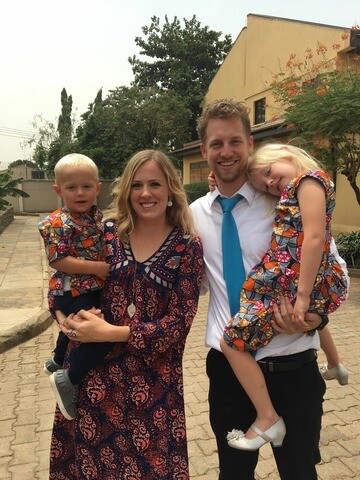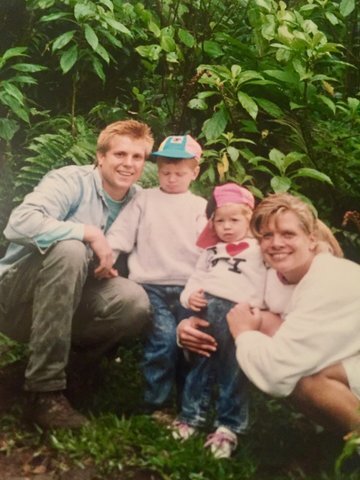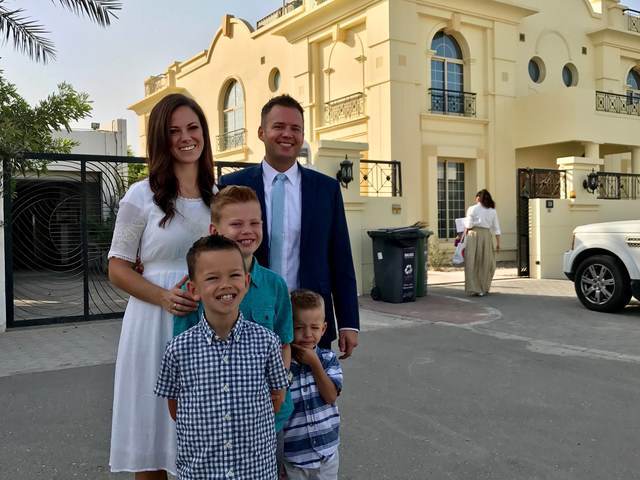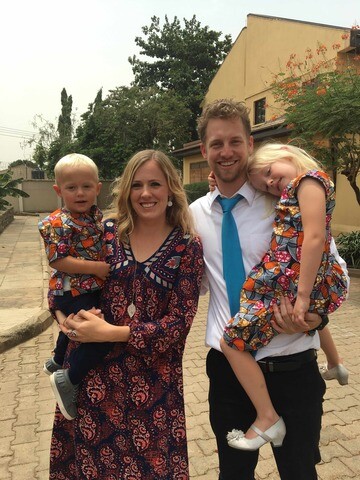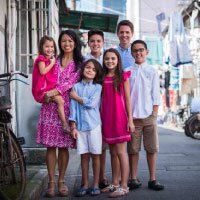Expensive, 8-hour bus rides to the temple. Making do with different resources. Attending church meetings on Fridays. While the doctrine of the gospel does not change around the globe, the way Saints in different parts of the world experience and live the gospel can change dramatically. Take a peek inside the lives of four member families who have learned that there are many ways to live the gospel around the world.
The Gospel in Action
In his October 2018 general conference talk introducing the concept of “home-centered, church-supported” Sunday worship, Elder Quentin L. Cook said, “In many parts of the world, people choose to stay at the meetinghouse after the normal Sunday schedule to enjoy social relationships. There is nothing in this announced adjustment that would interfere with this wonderful and rewarding practice in any way.” Katie and Tanner Parkinson knew at least one part of the world he was referring to as their minds flashed to images of the chapel where they worshiped in Abuja, Nigeria, while Tanner was employed with the State Department.
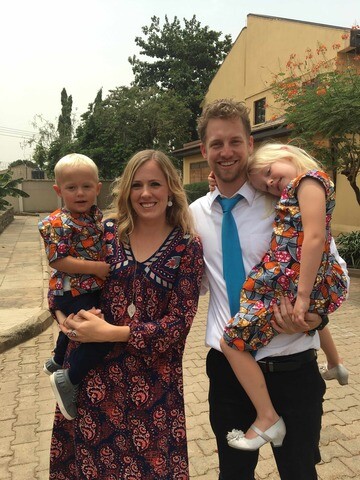
“It’s just like a family if you’re a member of the Church [in Abuja],” Katie says. “Everybody shows up early in the morning and then they leave late at night. In between, there’s Church.”
But that isn’t all they see when they think of their Church experience in Nigeria. They think of a Primary choir concert where they all, Katie included, wore matching outfits to perform with over 100 different Nigerian tribes. They think of the Primary president who worked full-time to provide for her large family and yet still baked a “ginormous” cake for each Primary child’s birthday. They think of a man in their ward who stood to bear his testimony and passed out because of dehydration—and how priesthood holders laid their hands on his head and started “pretty much yelling, ‘I bless you to live.’”
“They were just emphatically faithful in this blessing. …They run and they don’t think ‘What’s medically wrong with him?’ They just give him a blessing, they use the priesthood,” Katie says.
For Tanner, the sacrifices made by these members to attend the temple in Aba, Nigeria, are particularly meaningful.
“They would pray for months to find ways to make enough money to attend the temple,” Tanner says, explaining that the announcement during the October general conference of a temple to be built in Lagos, Nigeria, was thrilling for their young family of five as they once again thought of the Nigerian Latter-day Saints they had come to love.
The Parkinson’s Nigeria ward currently has one opportunity a year to attend the temple. The journey to the temple includes an 8-hour bus ride without air conditioning on “unimaginably” rocky roads, but Nigerians save and spend roughly a month’s salary (approximately $50 in US currency) to make the trip.
In this country where the gospel has only been around for 30 years, members in Abuja rely on the Church handbook for guidance in living their faith, since they haven’t had the benefit of observing established Church culture. Their conversion stories frequently include stories of pastors who found the gospel and then brought their entire congregation or villages into the Church.
The Parkinsons say that recent changes in the Church have helped members in Nigeria understand that “this is a global church and that things don’t need to be done the way they’re done in the United States,” Tanner explains.
“It’s amazing to see the gospel in action abroad because there’s no way that it would stay together if it wasn’t true,” Katie says. “There’s no way that these people who have sacrificed so much for the gospel would still [sacrifice] if it wasn’t true. It’s just all a miracle.”
Home-Centered Church: A Solar Panel
David Pierce moved outside of the United States for the first time when he was 9 months old, since his father was an architect who designed chapels for the Church. David has since lived in Scotland, Austria, Germany, and Costa Rica.
David had some experience living in different cultures by the time the young husband and father moved his own family to Costa Rica while he worked on his master’s thesis. But for David’s wife and children, the differences between the Church in the United States and the Church in Costa Rica were stark and disorienting.
“I had super culture shock. . . . Where do you prepare lessons? There are no copy machines. How am I going to make my handouts?” David’s wife, Karen recalls with a laugh before becoming emotional. “I do still remember what it was like, even though it’s been 25 years or whatever, I still really appreciate the comforts of life in the Church that we have here [in the United States].”
Over time though, David and Karen found that while the resources that had been available to them as Church members in the United States were nice, they are not crucial in living the gospel.
David believes this is why we’re seeing some of the recent changes in the Church.
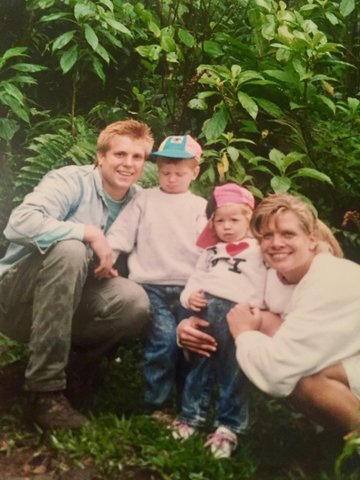
“[Home-centered church is] something that can be applied globally, regardless of resources, money, or access to photocopy machines and everything else you have because it’s all done in the home,” he says. He believes that home-centered Church allows the flexibility that is needed to adjust gospel living to different needs and life situations of those around the globe. He compares the old and new programs to a power grid vs. individual solar panels.
“Here in the United States, we have a well-developed electric grid system. So power is produced here in one location and is taken by all these power lines to every city, every town, every farmhouse. Why? Because we have money and the infrastructure to be able to do that.
“[But if] you take that electrification process to Africa where they have no money—they have no infrastructure—and set it up? Why not just give every farmer in Africa a solar panel? [Then] you don’t have to build that [electric grid] infrastructure,” David explains. ”We’ve got to come up with a way that we can take the gospel to that little farm hut out in the middle of nowhere in Africa and not have to have all of those resources along with it.”
“Jesus didn’t have all of those resources, so obviously the gospel doesn’t depend on those ancillary things,” David adds. “The differences inside the United States and outside the United States are materialistic to some extent.”
Visitors Welcome
There is a sign on many Latter-day Saints chapels around the world that reads “Visitors Welcome.” The Joey and Sheradon Orton family has experienced the truth of this sign firsthand. When her husband’s job took Sheradon, then a young wife and mother, to Australia after having been raised in Provo, Utah, the first thing she noticed was how kind and welcoming the people at church were. She recalls being touched to notice two young women in the ward who were comfortable attending church every Sunday despite being pregnant out of wedlock—something that she didn’t remember ever happening back home in Utah.
But no matter where she and her family have lived, Sheradon has always appreciated that feeling of being a welcome visitor and ward member. She recently found that welcoming spirit again in her family’s new home in Dubai, United Arab Emirates.
“I’ve loved feeling like everyone is welcome,” she says. “It doesn’t matter what your trials are or what you’re struggling with, with sins or whatever. This is where you’re supposed to be and come. We love you.”
Though the welcoming feeling is the same, Sheradon admits that the Church experience in Dubai is definitely different. For starters, the Muslim Sabbath falls on Friday, and as a result, the work week starts on Sunday and goes through Thursday. This means Latter-day Saints in Dubai also attend church on Friday. The ward the Ortons attend meets in a villa that has been converted into a chapel, where they gather with a melting pot of approximately 140-160 people from all around the world. And while members in Dubai have a meetinghouse close to their home, members elsewhere have a long journey to church each week. Sheradon says that in other parts of United Arab Emirates, members travel from remote villages to their Abu Dhabi meetinghouse three hours away just to attend church. A family in Abu Dhabi often hosts families overnight to make it possible for them to attend.
Sheradon says that her overseas church experience has changed her.
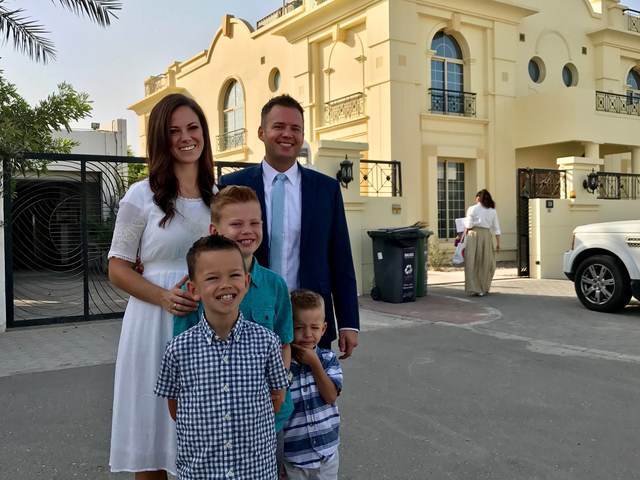
“I’ve learned a lot being away [from the United States] and realizing that we all have sins and things. [I have been] learning to open up more and be more welcoming, not accepting of those [sins], but accepting of the person and realizing that they want to change or want to be better,” she says. “I feel like a completely new person because of that change. There are just so many good people and so many good members around the world.”
A Bond and a Tie
While moving internationally after living in the United States can be a big cultural shift for some members, for other Latter-day Saints, the United States is a foreign place with its own cultural shifts. Such is the case for the children of Mateo and Sarah Furner.
The Furner family moved to Pennsylvania last year—a move Sarah Furner says was the family’s most difficult adjustment despite living in multiple countries over the years.
The Furners have raised their five children, who range in age from 6 to 16, in Switzerland, China, France, and Singapore. In each place, the family has formed strong friendships and found especially unique, fast-forming bonds with their fellow expat ward members and neighbors regardless of where they lived.
“I feel like my eyes are misting over just thinking of all these wards, just remembering everybody,” Sarah says. “It didn’t matter if you were married or single, with children or without, older or younger, I felt like the gospel blanket was just over all of us. We are one faith, we are all trying to come unto Christ, we’re in a foreign land together. ‘Let’s have Thanksgiving meal together,’ ‘Let’s celebrate that woman, her heart was just broken from divorce,’ ‘Let’s throw her a birthday party,' and it doesn’t matter how old you are, you’re coming.
“I feel like definitely, the gospel ties us together, and there’s kind of a speed to it too. There’s no time to think, ‘Should I be that person’s friend or not?’”
She recalls a time when her husband had a kidney stone and she had to rely on members of their new ward for childcare, a blessing, etc.
“There is a bond and a tie [from international living] that probably those reading this article that have never had an international experience will say, ‘That sounds really neat.’ And every single person with an international experience will say, ‘I know exactly what she means.’”
Sarah says that she and her husband made great efforts during their time abroad to help their family learn about the different cultures in which they lived by encouraging her children to learn a foreign language, attending cultural events, and even organizing tours. They watched Buddhist monks in their temples, they went into Chinese people’s homes and got to know them, and they attended a festival called Thaipusam in Singapore. But, she says that ironically the more you get out into the wide world, the smaller it becomes.
In fact, the world is so small and Heavenly Father is so involved in the details of the lives of His children that a Chinese girl the Furners fostered in China ended up with an American Latter-day Saint family in Indiana. But it was also in China that the Furners experienced what it is like to live in a place where the gospel cannot be shared.
“In Shanghai, we drove an hour every Sunday to meet in [a place that was] kind of like a hotel, like a conference room, and every meeting started with saying and repeating that we could not proselyte and we didn’t have missionaries there. But that didn’t stop us from loving Chinese people,” she says.
While these international experiences have greatly enhanced the lives of the Furner children, in some ways it has made it difficult to adjust to life in their new Pennsylvania home, where they are the new kids at school or at church with other kids who have known each other since preschool.
No matter where the family lives the gospel, however, Sarah says that they all agree that “There is this feeling that we are all tied and linked together, and Heavenly Father’s got it all figured out. We are all so different but somehow we are all, in the eternal nature of things, family.”
Lead image courtesy of the Furner family
